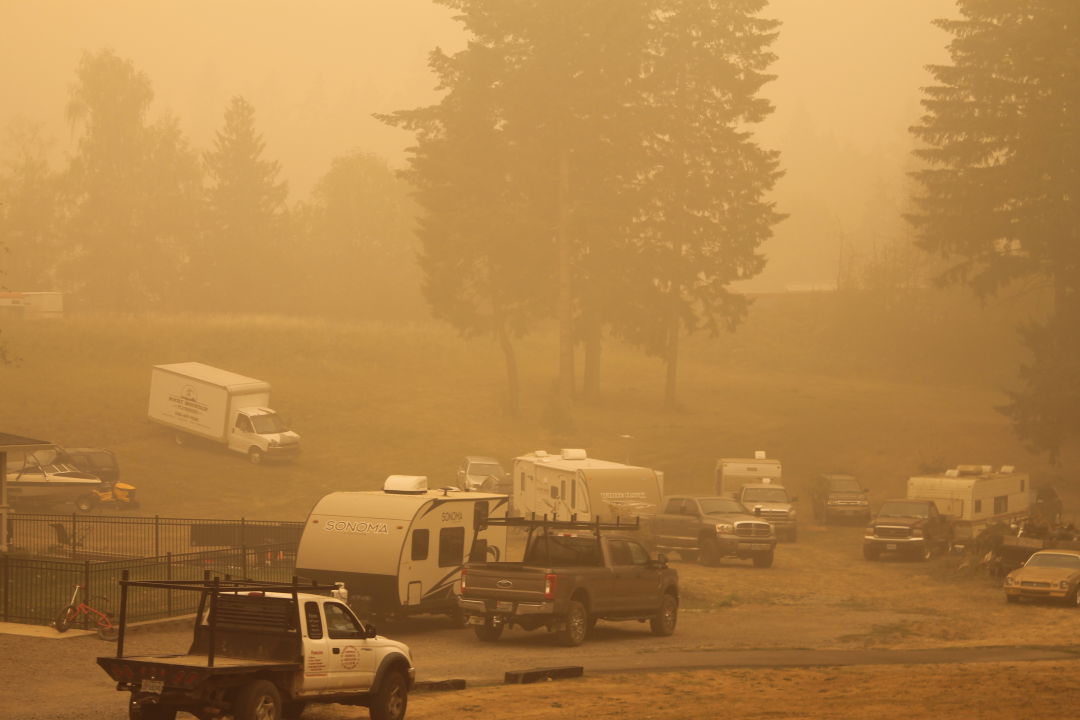"Where Will We Go?"

An image from the outskirts of Oregon City, Thursday afternoon. All along the rim of evacuation zones, trailers and campers are filling once empty fields.
Image: Riley Blake
Almost 40,000 Oregonians have left their homes in recent days, fleeing the 16 large wildfires that have consumed more than 1 million acres of land across the state in recent days. More than 450,000 have been told they should be ready to leave at a moment’s notice, should the fires spread; dozens of people are missing, mainly in Jackson, Lane, and Marion Counties, a number that’s expected to grow. State officials predict that long-term recovery will take years.
“We’ve not seen the likes of this fire in this state, this integrated with our communities ever before,” said Doug Grafe, chief of fire protection for the Oregon Department of Forestry, at Friday afternoon’s press conference with Gov. Kate Brown. Grafe added that fire crews will likely be fighting the eight largest of these fires until fall/winter rains begin in earnest.
In the meantime, almost of those who have evacuated and who are preparing to do so have the same question: Is anywhere safe?
In Clackamas County, evacuees fleeing from the Riverside Fire, which at 56 miles stretches from the Warm Springs Indian Reservation to Estacada and covers 440,000 acres, were first directed to a shelter at Clackamas Community College in Oregon City and then to the Clackamas Town Center mall, at the edge of Portland. Portland Monthly visited the CCC shelter this week and spoke with some of those who’ve forced to leave their homes.
Ryan Coleman, 45, of George, Oregon, left his home Wednesday after returning early from a hunting trip. “I couldn’t believe how much the air quality had changed in just a few days. I’ve never seen anything like this,” Coleman says. “My first thought was, ‘Where will we go?’”
Since evacuating, Coleman’s family stayed with friends until they, too, were given evacuation orders. “It’s the weirdest thing. You see it on TV but you never think it will happen to you. I just hope everybody makes it out in time.”
Linda Butler, 37, of Estacada, says her family has had to move location’s twice since evacuating. Butler is currently staying in an RV with her two children. “There’s a lot of locals that are leaving one behind,” she says. Butler’s family evacuated Tuesday night; her husband staying behind. “My brother’s doing the same [as my husband]: mitigate, wet things down, and watch for sparks.”
Betty Preston, 68, of Molalla, who evacuated Wednesday night, doesn’t understand the people who stayed. “They can’t kick you out. You have the right to stay. And the right to die. But I don’t know why anyone would choose to do that.”
The drive from Molalla to Clackamas Community College typically takes Preston a maximum of 30 minutes. On Wednesday night, it took Preston two and a half hours. “We had no clue what to expect. The cars just kept coming. As far as the eye could see.”
Debra Long, 63, of Estacada, left in the early hours of Wednesday morning. “First we heard the cars, then we heard a knock on the door and my husband got up and answered,” Long said. “I asked for his badge. He told me, ‘I’m a detective ma’am. I don’t need one.’”
After Long and her husband left, they went straight to the nearest Red Cross evacuation site: “A good thing to come out of this is the people that are helping each other. It just warms my heart to see everyone coming together. Even back in town still, we’ve got people from the drilling companies filling up tankers with water, trying to do what they can,” Long said. “It may be a disaster but it’s brought out the best in people. It really shows that no matter what, your community is there for you.”




